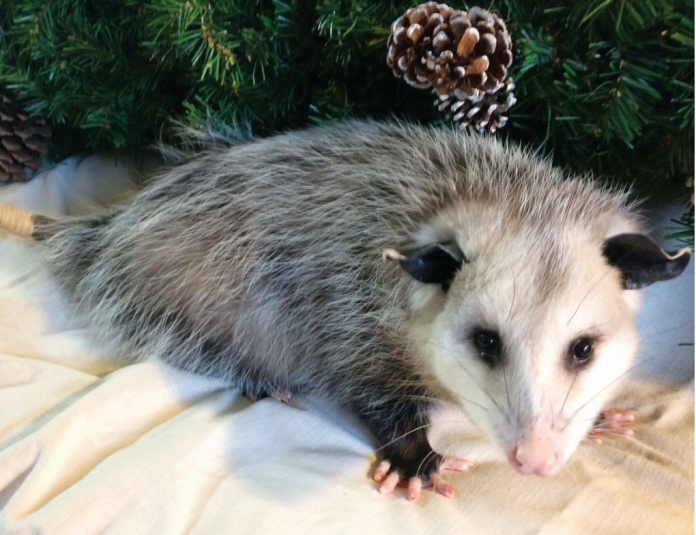
I confess that I’m not very good at keeping my New Year’s resolutions to lose weight and exercise more. This year, however, I’m going to try a different tactic to keep me on track—emulating an opossum. Specifically, Violet, the educational opossum at the Wildlife Education and Rehabilitation Center.
Diet: Opossums are sometimes indiscriminate eaters (aka omnivores) and captive ones can be prone to obesity, just like humans. But for Violet, in order to keep her figure trim, we serve natural goodies like veggies and fruits and proteins, i.e., small rodents, fish, and fowl—mimicking the foods she might find in the wild.
As I promise myself every January 1 (after the fattening holiday celebrations are over), I, too, will start eating better. Bye-bye burgers, adios apple fritters, sayonara sausage pizzas, ciao cake, candy, and cookies. I will say hello to healthy and natural foods—like Violet’s list minus the rodents.
Exercise: My plan is to rejoin the gym after neglecting my membership for months (many months). Violet, though, has a head start on me and diligently uses her exercise wheel every night to keep in shape. I will do my waddling on a treadmill.
Different strokes: By the time I’m zonked out and unable to keep my eyes open to watch the mirrored ball drop on New Year’s Eve, the nocturnal opossum is ready to party hearty. She goes to bed at a reasonable hour for an opossum, before sunrise—the unreasonable time I’m waking up to get ready for work.
Tale of a tail: Violet’s mother was found alongside a road, killed by a vehicle. The good Samaritan who checked on the poor animal discovered a litter of tiny orphans clinging to her and brought them to Monterey County SPCA. Unfortunately, as the babies grew up, they began chomping on each other’s tails. Violet got the worst of it, and her wound became infected, requiring amputation of half her tail. She was still considered releasable but that attempt failed as she had become too habituated (tame). Fortunately, she has a demeanor that makes her a wonderful ambassador to help promote the diversity of and respect for our native wildlife. With the approval of the California Dept. of Fish and Wildlife, Violet joined WERC’s team of animal ambassadors.
Virginia opossums are North America’s only marsupial (animals with pouches to carry their babies). They are solitary critters and will not attack if left alone. If hissing and baring their 50 teeth doesn’t scare away a predator, they will “play sick” by drooling and pooping; if that doesn’t work, they will “play dead”—an involuntary, coma-like state lasting from a few minutes to a few hours. They survive on a diet of fallen fruit, snails, slugs, rodents and carrion—a benefit to our environment and friend of gardeners.
Miss Violet O’Possum visits schools in WERC’s Feather, Fur, and Scales program. These programs are gifts that keep on giving, inspiring and educating children about nature, wildlife and the environment and provide an up-close look at some of our local native animals. The programs meet many and/or all of California’s Life Science Standards for grades K-6. For more information, visit www.werc-ca.org. By Colleen Grzan.








